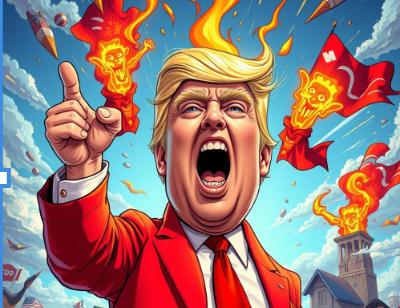$AAPL $AMZN $META
#Trump #Tariffs #TechStocks #Apple #Amazon #Meta #Google #DigitalTax #TradeWar #Investing #StockMarket #USPolitics
Former President Donald Trump has directed his trade representatives to reopen investigations into digital services taxes implemented by various countries targeting American tech giants. This move signals potential retaliatory trade measures, including tariffs, to counter what the U.S. perceives as unfair taxation on its leading digital firms such as Apple ($AAPL), Amazon ($AMZN), Meta ($META), and Google parent Alphabet. Countries, particularly in Europe, have introduced digital services taxes as a way to capture revenue from tech giants that operate in their jurisdictions but often report profits in low-tax nations. The Trump administration previously fought such measures, arguing they disproportionately target American firms while shielding domestic competitors. This latest directive, if followed by action, could escalate trade tensions and impact multinational market performance.
Global financial markets are already reacting to the implications of this move, as investors assess the potential economic consequences. Tech stocks have been among the best-performing assets in recent years, enjoying substantial growth fueled by digital transformation and increasing online commerce. However, new tariffs or retaliatory trade policies could introduce regulatory uncertainty, adding pressure on companies’ international operations. Imposing tariffs against countries that levy digital service taxes may lead to reciprocal actions, potentially affecting broader sectors beyond tech. Investors will likely keep a close watch on U.S. trade negotiations, as any escalation could introduce volatility to both the stock market and currency markets. The dollar’s performance against major currencies may fluctuate depending on how international partners choose to respond.
Additionally, industry leaders have voiced concerns over the long-term impact of such trade decisions, warning that tariffs could lead to higher operational costs and reduced global competitiveness for U.S. firms. While Trump’s latest move aims to protect America’s tech sector from additional financial burdens, it may also increase diplomatic challenges with key economic partners such as the European Union, the United Kingdom, and Canada. If international tech firms operating in the U.S. face retaliatory trade barriers, the outcome could influence the broader business environment, potentially affecting foreign investment inflows. This uncertainty highlights the complex relationship between taxation, global commerce, and national economic policy, with stakeholders from multiple sectors monitoring developments closely.
Market analysts argue that while short-term stock fluctuations are likely, the long-term impact of these trade policies will depend on their execution and countermeasures from affected countries. A protracted trade dispute could pressure technology stocks, though some analysts believe U.S. firms may benefit if new negotiations lead to more favorable tax agreements. Investors will be watching earnings reports for signs of shifting financial strategies in response to evolving policies. With digital commerce driving significant market growth, regulatory clarity remains crucial. Whether Trump’s directive results in actual policy changes or remains a political maneuver, it underscores the ongoing debate over digital economy taxation and its broader implications for global trade dynamics.







Comments are closed.